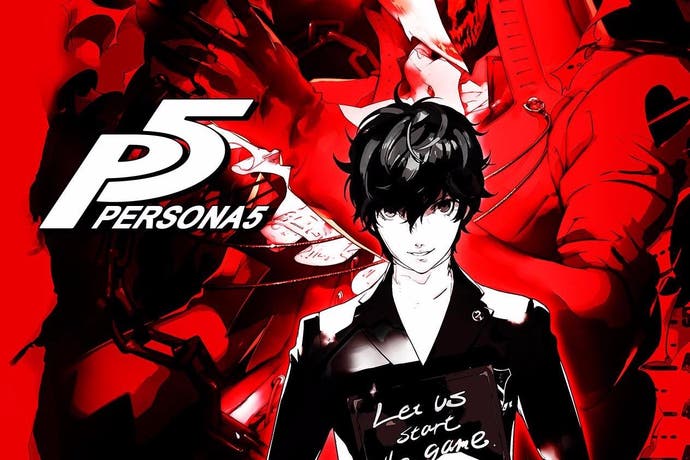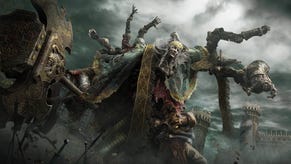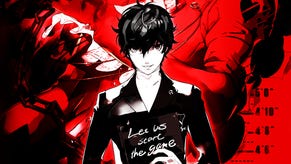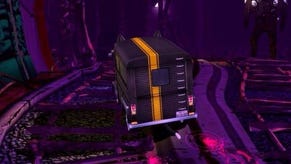Persona 5 review
Tokyo story.
Real talk: if you've played Persona, if you've enjoyed JRPGs, if you even have a passing interest in Japanese media, there's absolutely no reason to read this frankly ponderous review. Persona 5 is everything you've wanted: style and substance distilled into an experience worth waging cultural wars for.
If you don't like JRPGs, well, I can't help you there.
Everyone else? Buckle in.
What you need to understand about Persona 5 is that it's not stylish, it is style incarnate. It is the alpha and omega of menu design, a masterclass in exquisite camerawork, the scripture which future pundits will invoke when discussing topics like, "When saving the game, do we really need an innocuous two-second animation most people will miss?"
(Yes. The answer is yes.)
Ask me five years ago if I ever thought she'd be waxing hyperbolic about menus, and I'd look at you funny. But Persona 5's interface is jaw-dropping, utterly fearless in its use of bold colors, ransom note-style fonts, its commitment to its own aesthetics. While the menu system isn't obtuse in any way, it is also loud, a stark chiaroscuro of illustrations superimposed over tessellating patterns; catchphrases bolted on street signs, all pulsing gently to the beat of the ambient soundtrack. I can absolutely picture Persona 5's developers sitting down together in a conference room, looking over a to-do list, and then grinning like Chesire Cats as they growl, "Let's go bigger."
God, this game is so beautiful, it's practically a crime.
There's a reason I won't stop banging on about the visuals. It is because they are representative of the game at large. At its core, Persona 5 is exactly as advertised: the latest installment in a long-running franchise, which features turn-based combat and the ability to just hang out with your buds. Sure, we've got a few new variables, the reintroduction of a gameplay element from the earliest Persona games, and a dungeon system that is, for once, actually fun. Overall, though? Same old, same old.
And that is okay.
Because, like with its menus, Persona 5 doesn't try to break the mold. Instead, it measures the elasticity of physics and then stretches the limits as far as they will go. Shall we have two concurrent timelines, one feeding into the other, even as the narratives blaze towards an inevitable convergence? Sure. Social Links - now called Confidants - that bolster your statistics, even provide new combat-adjacent abilities? Absolutely. Entire vignettes where your ability to interact with the game is pared down to almost nothing? Uh huh. The ability to slack off in class? Yes, totally. A fishing mini-game? I - okay.
Daleks?
Potentially copyright-infringing mechanoids aside, Persona 5's narrative is evocative of everything we've come to associate with the series. Once again we have a cadre of teenagers, all coming together to confront both the tribulations of high school and a supernatural mystery. But unlike their predecessors, these kids are misfits, ostracized by their peers, unable and unwilling to fit into a world that will not provide them the compassion of fair treatment. The biracial girl who stands accused of inappropriate relations with the teacher. The disgraced track star from an abusive household. The shut-in blamed for her mother's death. The class president dehumanized, despised for her desperation to achieve the goals set for her by the dead.
Of course, they're all more than the rumours insist. With time and pursuit of their individual arcs, their pasts unlock, revealing characters full of pathos and depth. There's a full suite of Confidants, side characters and all, to acquaint yourself with. A surprisingly large number of them, according to what I've heard, are romanceable too. What's delightful about the Persona 5 is where they've taken the use of Confidants. I won't spoil anything, but eyebrows went up after the outcome of a certain interaction. They haven't come down since.
Bravo, Atlus. Bravo.
Moving on, let's wind back and break down how the game works first.
Persona 5 opens with a daring escape, one that involves darting across the chandeliers of a casino. Chatter thrums without explanation. All we know is that someone named Oracle is telling us to go, go, go. It is here that we are briefly introduced to both the combat mechanics and the stealth elements. The former will be familiar to anyone who has experience with turn-based RPGs: you select actions for specific characters in hopes of minimizing resource expenditure, maximising damage, and hitting enemies where it hurts. (Elemental weaknesses are a thing in Persona.)
The stealth part, though, that's different. For the first time (at least in my memory), Persona no longer requires you to gallivant about dungeons, hoping to smack enemies with your weapon-of-choice before they notice you, thereby granting you the strategic advantage. Instead, you'll be able to flit from hiding place to hiding place, all with a button press. This gift of subterfuge can be used two ways: to elude conflict, or to launch an ambush sequence that involves the main character leaping onto their adversary.
Shortly after that interlude, the timeline splits, and the main story begins as a flashback. Without spoiling too much, I'm going to take the opportunity to say that Persona 5 doesn't waste its time in establishing how dark it is willing to go; a one-two punch arrives in the first 20 minutes.
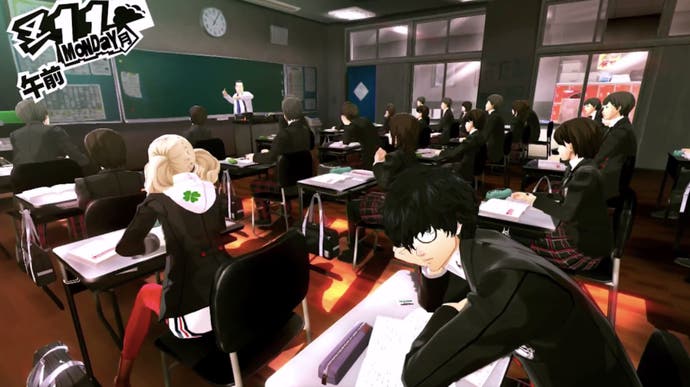
While the game never veers into the realm of bad taste, perpetually careful to avoid exploiting the subjects it interrogates, there may likely be occasions where it makes you flinch, or worse. The developers behind Persona 5 seem painfully aware that adolescence is not the halcyon phase that so many remember it as, but a claustrophobic time where the unlucky are abused, exploited, pushed down, and reminded over and over again that they are not yet the masters of their own lives.
This is driven home with the introduction to our protagonist, who has been sent to the city following an altercation in his hometown. At no point do any of the grown-ups that he encounters evidence any interest in his innocence. He is instantly vilified and condemned to scrutiny. Fortunately, it's not all doom. Though the first act of the game cannot be described as anything but 'holy shit, I can't believe we went there,' it is also where we're introduced to delinquent Ryuji Sakamoto, the idea of Palaces, and Persona 5's mascot Morgana.
Again, for the sake of avoiding spoilers, I won't tell you precisely how it all coheres, or why the three end up inside a dungeon. Instead, let's talk about Palaces. On the most basic level, they're just dungeons: a byzantine series of levels, dotted with enemies and demarcated by mini-bosses, with a final boss squatting at the end. In addition, every Palace comes with a few spatial puzzles. The first area, for example, will have you, among other things, rooting for tomes to slot into suspicious bookcases. It is all actually quite fun and Persona 5 genuinely surprised by raising the stakes with every Palace, complicating its inventory of puzzles, without ever sliding into tedium.
Narratively speaking, the Palaces - manifestations of the owner's inner psyche- are interesting because they're not just glorified arenas. Your party, who eventually christen themselves Phantom Thieves, infiltrate each fortress to steal a Treasure from its core, thereafter ensuring that its owner will repent their misdeeds. Of course, they don't outright steal the Treasure. What you actually do is lay out an "infiltration route" that takes you to the aforementioned prize. After that, your characters bail, return to the real world, and create a calling card to leave with their quarry. Then, you have the grand showdown, and it's really quite spectacular. No spoilers but, guys. Guys. I don't remember the last time that I've laughed outloud at a boss.
Anyway.
Where was I?
Like all recent Persona games, the latest iteration will allow to make believe you're a Japanese high school student with a secret identity. In between galloping through Palaces, you'll go to school, make friends, do part-time work, and find romance with any number of characters. For those of who you've played the game's predecessors, it's largely how you remember. School trips, examinations, teachers surprising you with questions as you stare dazedly out of a window. But at the same time? It is also so much more.
Persona 5 is flushed with little touches, both in regards to the school and everywhere else. In class, your characters exchange surreptitious text messages. Students gossip as you pass. Outside of the school, Tokyo is a richly detailed environment, full of back streets and side corners to explore, capsule machines, ramen stores, bathhouses nested into quiet neighbourhoods. I spent more time than I thought I would just wandering through the world that Atlus has created. I wasn't looking for something to interact with, some new mechanism that would allow me to improve a statistic, somewhere. I just wanted to experience the world.
Having never been to Japan, I can't tell you how accurate the setting is, whether Atlus has taken liberties with their cartography, whether it is true to life, but I can say this: it's beautiful.
(Of course, it also helps that there are plenty of things to do in Persona 5's Tokyo. Maid cafes, games of baseball, even the opportunity to fish? 80 hours in the game, I surprised myself with the discovery of a working crane machine.)
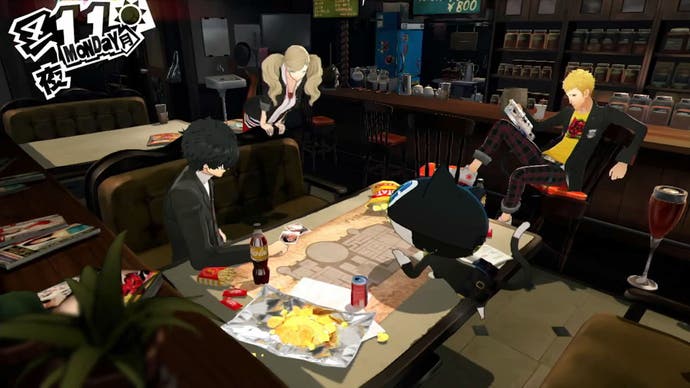
So, does that mean Persona 5 is basically perfect?
Yes.
No.
It really depends. Holistically speaking? Yes. God, yes. Weeks have passed, but my inner fangirl hasn't reconstituted. My joy in this game could be described as nearly religious. For anyone who has grown up with the series, it is everything that you could ask for.
But there are problems.
For one, Persona 5 continues the franchise's awkward relationship with queer-coded people. Despite being a game about teenagers finding the truth of themselves and breaking through societal constraint to live without fear, there are no explicitly queer individuals to be found. Well, that's not precisely true. A bar in the red-light district is possibly operated by a drag queen. I'm relieved to say that the game largely treats her with courtesy. In my playthrough, at least, she escapes being transformed into a punch line.
The same, unfortunately, cannot be said about the two fashionable men who accost Ryuji several times during the game. They're every negative gay stereotype you can imagine and the best thing I can say about the whole situation is that Persona 5 minimises their screentime.
On a slightly less troubling note, I'm not especially impressed with the localisation efforts. The pronunciation of certain names are questionable, and I'm not sure how I feel at all about the way the game explains the pseudo-scientific elements of its story. However, all this may well be a case of personal taste.
Overall, though? I stand by what I've babbled. Persona 5 is unconscionably sublime. Every beat, every subtlety, every movement of the camera - it all translates into a kinetic masterpiece, strung together with the best visuals this side of Atlus. Persona 5 won't change your mind on JRPGs if you lack a taste for the genre, but if you're in any way a fan, well -
Why the hell are you still reading this?
Go forth and damn well purchase.
